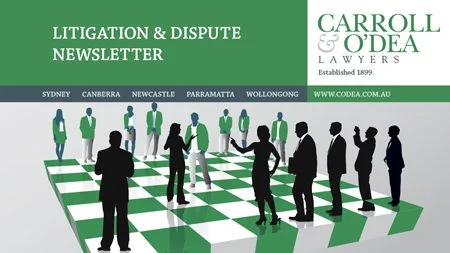
Commercial and Litigation Newsletter – January 2015
Published on January 1, 2015 by Adrian O’Dea
Dear Reader,
Welcome to the first issue of our Commercial Litigation Newsletter.
We aim with this newsletter to provide you with summaries of recent developments in the area of Commercial Litigation and Dispute Resolution and to canvass topics that may be of interest to you.
Our first issue is being sent to you as an invitation to subscribe to subsequent newsletters.
In this introductory issue we report to you on the following:
- Changes to the NSW Home Building Act statutory warranties scheme – commencing from 15 January 2015.
- Methods of enforcing a monetary judgment obtained in your favour – an outline of the steps that you can take to enforce a judgment.
- Judgment debts and caveats – a discussion as to whether you can lodge a caveat over the property of someone who owes you money pursuant to a judgment debt.
- Good faith in mediation: is it enforceable – a discussion of whether the commonplace requirement to mediate in good faith is enforceable and, if so, what behaviour may satisfy the requirement to mediate in good faith.
- Case update – 2 Elizabeth Bay Road Pty Ltd v The Owners – Strata Plan No 73943 [2014] NSWCA 409, December 2014
- Case update – Wright v Lend Lease Building Pty Ltd; Intercon Engineering Pty Ltd v Lend Lease Building Pty Ltd [2014] NSWCA 463, December 2014.
We hope you enjoy our first issue and we look forward to providing you with further updates in this area of law in future.
The Carroll & O’Dea Litigation and Dispute Resolution team
Changes to the NSW Home Building Act statutory warranties scheme

The Home Building Amendment Act 2014 was passed by the NSW Parliament on 28 May 2014. The Act contains numerous amendments to the Home Building Act 1989 (“HBA”). NSW Fair Trading has announced that the changes to the HBA in relation to the statutory warranties scheme will commence from 15 January 2015. As well, new regulations (the Home Building Act Regulations 2014) have been proposed and are expected to commence at the same time as the amendments to the HBA.
Methods of enforcing a monetary judgment obtained in your favour
As a first step, you should write to the person or company that owes you money (the judgment debtor) and request that they make payment of the judgment amount to you by the time specified in the judgment (which is usually 28 days).
In the event that the judgment debtor does not make payment of the judgment amount to you, steps can be taken to enforce the judgment.
Judgment debts and caveats
You can only place a caveat over real property if you have a caveatable interest in that property. A Court judgment against a person does not necessarily create a caveatable interest in real property giving rise to an entitlement to lodge a caveat over it. If you improperly lodge a caveat, the potential costs consequences and damages that may be awarded against you can be significant.
Good faith in mediation: is it enforceable?

The obligation to negotiate in good faith is often found in commercial agreements. Commercial contracts will often include a Dispute Resolution Clause that provides that if a dispute arises in connection with the contract, a party must not commence court proceedings unless that party has participated in mediation in good faith. As well, there are certain circumstances where there is a legislative requirement to attend mediation and participate in good faith.
Case updates – December 2014
2 Elizabeth Bay Road Pty Ltd v The Owners – Strata Plan No 73943 [2014] NSWCA 409
The Owner’s Corporation of a building in Elizabeth Bay commenced proceedings against the developer for defective building work carried out on common property. It is a requirement of s 80D of the Strata Schemes Management Act 1996 (NSW) that a general meeting of the Owner’s Corporation pass a resolution approving the commencement of proceedings, however a resolution was only passed at an annual general meeting after the proceedings had been commenced. The developer sought an order that the proceedings be struck out or dismissed because of the failure to comply with s 80D of the Strata Schemes Management Act 1996 (NSW) by reason of the delay in the passing of the resolution.
Case updates – December 2014
Wright v Lend Lease Building Pty Ltd; Intercon Engineering Pty Ltd v Lend Lease Building Pty Ltd [2014] NSWCA 463
The appellant subcontractors entered into four subcontracts with Lend Lease Building Pty Ltd (“Lend Lease”) which provided, amongst other things, for the retention of monies by Lend Lease. The subcontractors were entitled to the release of the retention moneys at the expiration of the “Defects Liability Period”, as defined in the subcontracts (which also made reference to the Head Contract).
The information contained in this article is not to be taken as legal advice. Please contact us if you require specific information or advice.
For enquires, please contact Adrian O’Dea (Partner) on 02 8226 7307 or aodea@codea.com.au, Daniel O’Brien (Associate) on 02 9291 7185 or dobrien@codea.com.au or Lara Piercy (Associate) on 02 9291 7189 or lpiercy@codea.com.au
